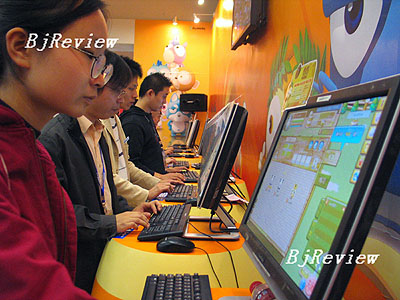
The 18-year-old Wang Chengyu lives a double life. In the real world he is a student at Hainan University. Online he is a merchant earning his money off Q coins.
A Q coin is a kind of virtual currency developed by Tencent Inc. In order to find a fast and convenient way to collect user fees, Tencent developed a virtual currency system called Q coins, or Q money, in May 2002. One Q coin equals one yuan, and users can recharge their QQ game account by buying Q coins through a username and password system.
“Q coins are just like the U.S. dollar in real life,” said Wang.
Recently, Tencent has become one of the most envied companies in China. Tencent statistics show that by the end of March 2006, the number of its active messenger accounts had reached 220 million. Q coins have become the pay channel of choice for most Chinese online game players. Users can not only buy virtual products in the virtual world, but also make a real fortune from the web-based coin in the real world.
According to traditional economics, money has five major functions: medium of exchange, measure of value, store of value, standard of deferred payments, and world currency. In the virtual world, a Q coin already encompasses the first four functions and is seemingly ready to take the place of yuan.
Cao Honghui, an expert with the Chinese Academy of Social Sciences, said that virtual money not only poses new challenges to the real financial system, but also generates new influences on the composition of the future monetary system. Cao argues that virtual money will certainly influence currency statistical patterns. Because virtual currency has replaced some functions of official currency, it will influence the M0 and M1 supply of the central bank, thus affecting money distribution and currency policies, he said.
Li Chao, a senior official with the central bank, said that the government has already attached great importance to virtual money and is further researching the phenomenon. Li said the central bank will draft management regulations regarding e-currency next year.
Regulation vacuum
Eight years ago, Tencent promoted an instant messenger service called QQ-represented by a penguin. At present, this cute little penguin is installed on nearly every Chinese computer, and QQ messenger has become one of the best-known chatting applications among Chinese netizens. Tencent has also developed many other entertainment programs, emerging as the largest entertainment and gaming gateway in China’s mainland market.
In March 2002, when the number of registered users of QQ exceeded 100 million, the most pressing issue for Tencent became how to charge service fees for some of its added-value services. Students, QQ’s largest user group, could at most afford only several yuan per hour. “Going back and forth to the post office to pay for such services would be too much trouble,” said Song Yang, a public relations manager with Tencent.
Creating the Q coin market was the solution.
Wang said that compared with other virtual currencies, the Q coin has the longest history with the largest proportion of users and can be used in multiple places. Because of these factors, as well as its popularity, it is unlikely to depreciate in value. Q coins serve as the universal equivalent of real money in virtual transactions, bridging virtual and real fortunes. The introduction of Q coins brought Wang Chengyu an opportunity to make money.
That’s because in QQ games, players can get Q coins if they win the game.
“Many people tend to cheat in games to get more Q coins,” said Wang. He contends that he is only an intermediary in these transactions, he doesn’t see anything wrong with profiting from it. “There are many online games in China. Many players would like to buy virtual items to get the upper hand. Because of this, I will buy some gaming items which I think are valuable and then sell them online in Q coins.”
Wang said he buys the items at a lower price and then sells them at a higher price, earning money off the discrepancy. Doing this, Wang can earn about 2,000 yuan each month.
In China, 2,000 yuan a month is good pocket money for a university student. Wang admitted that since he started dealing in Q money online, he had never asked for money from his parents. Yet, when confronted with the question of whether he’d ever paid taxes on income from Q money, Wang pled ignorance.
“I have never thought of paying taxes and nobody has ever raised the question of paying a tax,” said Wang.
According to current Chinese tax laws, individuals must pay personal income tax if their monthly salary exceeds 1,600 yuan. But in effect, income from online transactions is not covered by the current taxation system.
| 